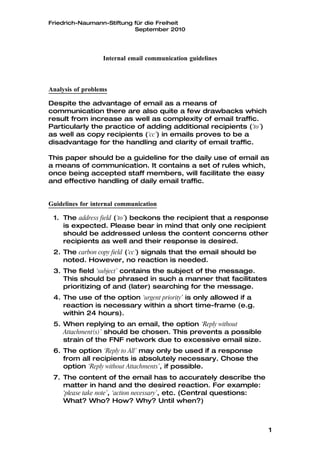
Internal email communication guidelines
- 1. Friedrich-Naumann-Stiftung für die Freiheit September 2010 Internal email communication guidelines Analysis of problems Despite the advantage of email as a means of communication there are also quite a few drawbacks which result from increase as well as complexity of email traffic. Particularly the practice of adding additional recipients (‘to’) as well as copy recipients (‘cc’) in emails proves to be a disadvantage for the handling and clarity of email traffic. This paper should be a guideline for the daily use of email as a means of communication. It contains a set of rules which, once being accepted staff members, will facilitate the easy and effective handling of daily email traffic. Guidelines for internal communication 1. The address field (‘to’) beckons the recipient that a response is expected. Please bear in mind that only one recipient should be addressed unless the content concerns other recipients as well and their response is desired. 2. The carbon copy field (‘cc’) signals that the email should be noted. However, no reaction is needed. 3. The field ‘subject’ contains the subject of the message. This should be phrased in such a manner that facilitates prioritizing of and (later) searching for the message. 4. The use of the option ‘urgent priority’ is only allowed if a reaction is necessary within a short time-frame (e.g. within 24 hours). 5. When replying to an email, the option ‘Reply without Attachment(s)’ should be chosen. This prevents a possible strain of the FNF network due to excessive email size. 6. The option ‘Reply to All’ may only be used if a response from all recipients is absolutely necessary. Chose the option ‘Reply without Attachments’, if possible. 7. The content of the email has to accurately describe the matter in hand and the desired reaction. For example: ‘please take note’, ‘action necessary’, etc. (Central questions: What? Who? How? Why? Until when?) 1
- 2. Friedrich-Naumann-Stiftung für die Freiheit September 2010 8. To facilitate further handling, only one matter should be addressed per email. 9. In case of absence for more than one working day, an electronic ‘out of office note’ should be set up. Please mention the contact person in your absence. 10.Every email has to contain the signature of the addressor, including full contact details (cp. CD manual). 11. Comprehensive information regarding national and international change of staff should only be given if the staff in question is in contact with all national and international personnel. In other cases a note to relevant working unit is sufficient. 12.Specific regulations for the IP department: Only the Section Head IP and regional departments need to be informed of office closures due to holidays/vacation/etc. Regional Departments can be contacted regarding availability of regional offices. 13.Specific regulations for the PBB department: Only the Section Head PBB and other operation units need to be informed of an operation unit’s temporary closure due to holidays. The Section Head can be contacted regarding the availability of operation units. 14.Communication via email has the potential to prolong conflicts. In case of conflict it is advisable to seek personal dialogue. This applies in particular to long lasting email correspondence if it is evident that no conflict solution can be found. The FNF is subject to compulsory periods of record-keeping as stipulated in tax, commercial, and subsidy law. Therefore, the FNF directive regarding the safekeeping of business records (Richtlinie für die Aufbewahrung von Geschäftsunterlagen in der Friedrich-Naumann-Stiftung für die Freiheit), dated 01/06/1999, also applies to email communication. Important emails are to be printed and filed until final settlement with the various funding bodies has been reached. Staff C+E 09/09/2010 2